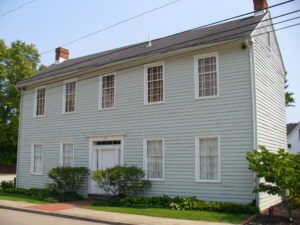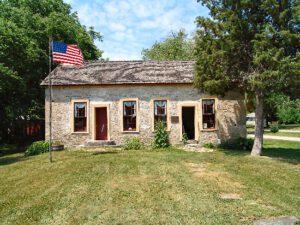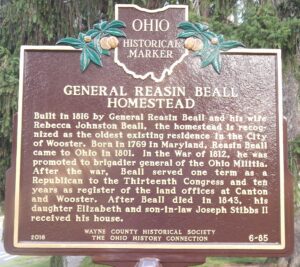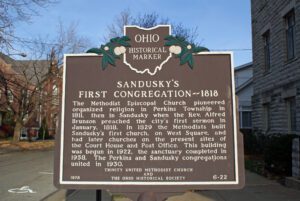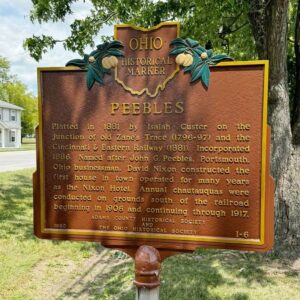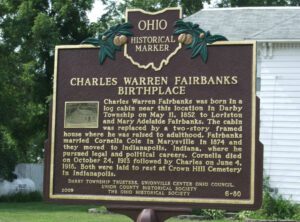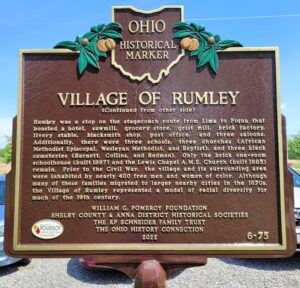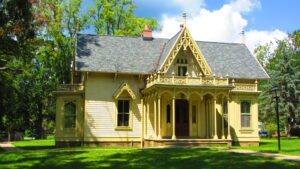, OH
First Lady Lucy Ware Webb Hayes was born in this four-room Federal Vernacular house in 1831. Well educated for her time, she attended local schools, took classes in the preparatory department of Ohio Wesleyan University in Delaware, and graduated from Wesleyan Female College in Cincinnati in 1850. She married lawyer and future U.S. President Rutherford B. Hayes in 1852. They raised five children to adulthood. As a colonel’s wife during the Civil War, “Mother Lucy” boosted morale for the soldiers of the 23rd Ohio Volunteer Infantry regiment. In 1870, during Hayes’ first term as governor of Ohio, Lucy helped establish the Ohio Soldiers’ and Sailors’ Orphans’ Home as a state institution. (continued on other side)
, OH
Built in 1822, this native limestone structure was the home of Benajah Wolcott, first keeper of the Marblehead Lighthouse (originally called the Sandusky Bay Light), and his second wife, Rachel Miller Wolcott. Benajah maintained the lighthouse from 1822 until his death ten years later. After Benajah’s passing the U.S. Government appointed Rachel as the keeper, making her the first female lighthouse keeper on the Great Lakes. The building is the oldest known residence still standing in Ottawa County and is a fine example of a “hall-and-parlor house,” an early American home design.
, OH
Built in 1816 by General Reasin Beall and his wife Rebecca Johnston Beall, the homestead is recognized as the oldest existing residence in the City of Wooster. Born in 1769 in Maryland, Reasin Beall came to Ohio in 1801. In the War of 1812, he was promoted to brigadier general of the Ohio militia. After the war, Beall served one term as a Republican to the Thirteenth Congress and ten years as a register of the land offices at Canton and Wooster. After Beall died in 1843, his daughter Elizabeth and son-in-law Joseph Stibbs II received his house.
, OH
The Methodist Episcopal Church pioneered organized religion in Perkins Township in 1811, then in Sandusky when the Rev. Alfred Brunson preached the city’s first sermon in January, 1818. In 1829 the Methodists built Sandusky’s first church, on West Square, and had later churches on the present sites of the Court House and Post Office. This building was begun in 1922, the sanctuary completed in 1958. The Perkins and Sandusky congregations united in 1930.
, OH
Platted in 1881 by Isaiah Custer at the junction of Zane’s Trace (1796-97) and the Cincinnati and Eastern Railway (1881). Incorporated 1886. Named after John G. Peebles, Portsmouth, Ohio, businessman. David Nixon constructed the first house in town, operated for many years as the Nixon Hotel. Annual chautauquas were conducted on grounds south of the railroad beginning in 1906 and continuing through 1917.
, OH
Charles Warren Fairbanks was born in a log cabin near this location in Darby Township on May 11, 1852 to Loriston and Mary Adelaide Fairbanks. The cabin was replaced by a two-story framed house where he was raised to adulthood. Fairbanks married Cornelia Cole in Marysville in 1874 and they moved to Indianapolis, Indiana, where he pursued legal and political careers. Cornelia died on October 24, 1913 followed by Charles on June 4, 1918. Both were laid to rest at Crown Hill Cemetery in Indianapolis.
, OH
The Temple of Rumley Church is of one of two remaining buildings in what once was Rumley, a thriving African American community in Shelby County. On May 19, 1837, the village was surveyed for Amos Evans, who built his hewed log dwelling and store. Brothers Joel and George Goings (aka. Goens), freed black men from Monongalia County, Virginia, purchased 80 acres of land that same year. They settled with their families near Rumley in Van Buren Township along with other free men and women of color, including former slaves. Joel Goings erected the first brick house in 1841, using bricks from his own brickyard. By 1846, the Rumley community stretched over 7,000 acres and included the Collins, Redman, Williams, Davis, Lett, and Brown families. (Continued on other side)
, OH
In 1938 the president of Kenyon College, Gordon Keith Chalmers, brought one of the nation’s most distinguished poets and critics, John Crowe Ransom, to the Gambier Hill. Chalmers brought Ransom to Kenyon College to create a distinguished literary review. With its first appearance late in 1938, The Kenyon Review would become one of the most influential and honored literary magazines in America. Among the authors Ransom published during his two decades as editor were Robert Penn Warren, William Empson, Flannery O’Connor, Doris Lessing, Robert Lowell, and Randall Jarrell. The Kenyon Review also became closely identified with the “New Criticism,” a method of interpreting literature that influenced succeeding generations of readers and teachers around the world. (Continued other side.)


